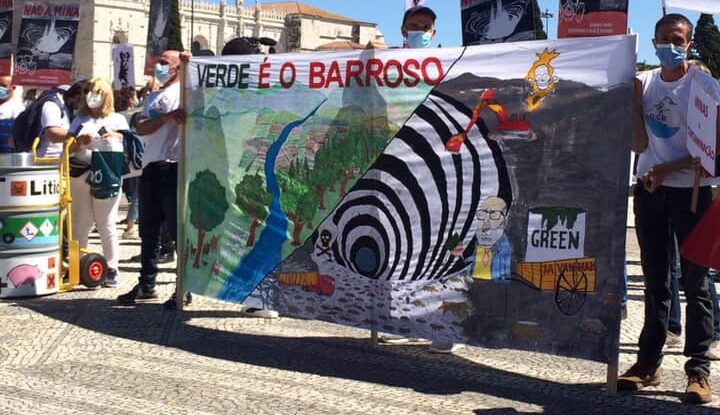Covas do Barroso is a village in Northern Portugal, in the Barroso region famous for its sustainable agriculture and traditional ways of life. It is home to the ‘Baldios’, a system where mountain lands are collectively used for agriculture, forestry or grazing, and enjoys a World Agricultural Heritage status. It’s also on the front line of a conflict in the ‘energy transition’ that demands the extraction of large amounts of lithium for batteries.
Covas de Barroso is being targeted as a ‘sacrifice zone’ for lithium mining, aligned with the EU’s strategy to bring mining home to the continent and meet mineral demands for the ‘energy transition’. Worldwide, markets are growing rapidly for electric cars, among other uses of batteries that require lithium, supported in part by national and regional energy strategies and policies.
The British company Savannah Resources and its Portuguese subsidiary, Savannah Lithium, are invested in advancing the Barroso Mine, Europe’s largest open-pit lithium mine since 2016, right on the doorstep of the village. Almost three years after the first Environmental Impact Assessment (EIA) was submitted for the Savannah project, and two years after the public consultation, the process is again open for public consultation.
However, the period given for public consultation is just ten working days, from 22 March to 4 April 2023. Given that the document contains some 1776 files, the community are reeling and understandably angry at what they see as a complete disregard of their rights.
The Covas de Barroso community argue that this is against their rights as well as European legislation. For example, they point out that Directive 2011/92/EU of the European Council on environmental assessment sets a minimum period of 30 days for consultation by the public. The Aarhus Convention also stipulates that consultation must have a “reasonable period … so that the public can prepare and participate effectively throughout the decision-making process.”
Catarina Alves Scarrott, of the Associação Unidos em Defesa de Covas do Barroso (UDCB), says that the mine consultation process has been limited to “symbolic acts” and the community has been “left in limbo” with unexplained delays to the publishing of the revised EIA. Local people suspect that this delay is political, and benefits only the mining company.
At a recent consultation meeting held by the mining company, residents of Covas de Barroso challenged the claims of Savannah about the project, and clearly communicated their disagreement with having the mine imposed upon them. With help from a hydrology expert on the first EIA, the community determined and communicated that lithium extraction would have impacts that violate their right to a clean, healthy and sustainable environment. They also anticipate that impacts on water quality could impact communities as far away as Porto.
Their concerns are echoed by the UN rapporteur on Human Rights and the Environment, David R. Boyd, who visited Covas do Barroso in September 2022. Boyd says: “Although Portugal has strengthened its standards for the mining industry in recent years, the current framework may not be adequate to safeguard unique areas such as Barroso.”
His report is deeply critical of the proposed mining in Barroso and against the imposition of mining in this region. “Sacrifice zones are completely incompatible with the human right to a healthy and ecologically balanced environment (art. 66 of the Constitution of Portugal) or to a clean, healthy and sustainable environment (General Assembly resolution 76/300).” The report concludes that the approval of a huge open pit mine in a community that is “a globally recognised example of sustainable development” is irreconcilable with Portugal’s environmental record.
Campaigners say that the advance of this project, with unexplained delays, lack of transparency and reported marginalisation, manipulation and intimidation of community members, has already created tension in a village that is usually tranquil. Most of the residents of Covas do Barroso are still in the daily business of rearing cattle and caring for their farmlands, so face a major challenge in responding to the very short consultation timescale that’s been imposed.
For the Portuguese government, lithium mining is a chance to get access to the raw materials for an ‘energy transition’, linked to a market that could be worth 250 billion Euros by 2025.
But for the people of Barroso, this latest news is yet another betrayal of their trust, and a failure of the mining company, the Government and the EU to meet the standards they have promised will accompany the EU raw materials strategy. They fear that Europe will echo the ‘resource curse’ of mining in the global south, if it is unable to get the first steps of consultation with communities in Europe done correctly.
Banner image: Unidos Em Defesa de Covas do Barroso
